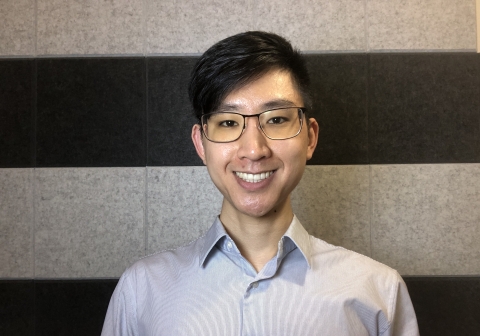In the Gilad Lab of Genetic Research at the University of Chicago, ARCS Scholar Anthony Hung carefully places tiny cells containing DNA fragments into a petri dish.
Hung is researching osteoarthritis, a degenerative joint disease. Specifically, he’s examining how genetics and environmental factors, such as mechanical stress on joints can lead to its development. According to the Mayo Clinic, human bones and cartilage are rarely studied.
“It is difficult to isolate genetic information from the tissues within our skeletal system,” he explains. “The skeletal system is important for our biology, and human health. Osteoarthritis is the number one cause of disability among the elderly. So, the idea of studying the disease interested me because it has the potential to vastly improve human health.”
| ARCS Scholar Anthony Hung sits at a cell culture hood used to create a sterile environment for cell experiments. He feeds cells in a petri dish with liquid containing nutrients that allow the cells to grow. Photo Courtesy: Anthony Hung |
Cell analysis is just one component in the graduate student’s research project that is being conducted in a dual degree program at The University of Chicago and the Pritzker School of Medicine. The ARCS Scholar (2019-2021) is working toward an MD / PhD with a focus on genetics, genomics, and systems biology. According to Hung, the dual curriculum focuses on training physicians and scientists, but also allows students to research a variety of issues concerning human health.
To better identify the causes of osteoarthritis, Hung created a system that ensures lab-created human cells resemble the cartilage within a person’s body. The method allows him to identify specific segments of DNA and manipulate the cell’s genetic code to study whether certain phenotypes are more susceptible to developing osteoarthritis. The protocol also allows Hung to test out theories using biomechanical stress on lab-generated cartilage.
|
The cell culture incubator keeps cells at the right temperature, and humidity and carbon dioxide levels so they can grow. These cells are grown on top of white plates with a flexible bottom. The plate can be loaded onto a device that will stretch out the cell membrane to test for mechanical stress. Photo Courtesy: Anthony Hung |
“In one of the experiments, we place the cells on these rubber bottom plates and apply a vacuum to stretch out the rubber membrane—which also stretches out the cells,” Hung explains. “Then we can study how the cartilage cells respond to stretching and stress, which is thought to be a potential cause of osteoarthritis.”
The graduate student says his research could lead to early diagnosis for people genetically predisposed to osteoarthritis, and even to the development of treatments to prevent the disease or slow down its progression.
According to Hung, receiving the ARCS Scholar award has been vital to his scientific training and research on osteoarthritis.
“The ARCS award and recognition forced me to think about the impacts my project could have for someone, other than a scientist, who is interested in what my research can produce and develop in the future,” he says. “I was able to present my work and communicate with a whole new audience as well.”
Outside the lab, Hung has a passion for serving the community in Chicago and spends two Mondays a month as the co-director for the Bridgeport Free Clinic, which is part of the Pritzker School of Medicine.
The clinic is staffed by volunteer medical students and physicians from the University of Chicago and connects underserved members in the Bridgeport and Chinatown communities, many of whom do not speak English.
As the son of Asian immigrants, Hung says he feels a strong connection with the clinic’s patient population.
“When I was growing up, I witnessed instances where a language barrier stood in the way of people getting medical help and general access to health care,” he remembers. “My goal is to serve this community, tend to their immediate health issues, help them navigate the American Healthcare system, and connect patients with a long-term primary care doctor that will ensure they receive preventative health information in the future.”
Hung says his future career plans include continuing his volunteer work at the free clinic, in addition to becoming a medical physician and opening his own lab to continue genomic research on other diseases.

